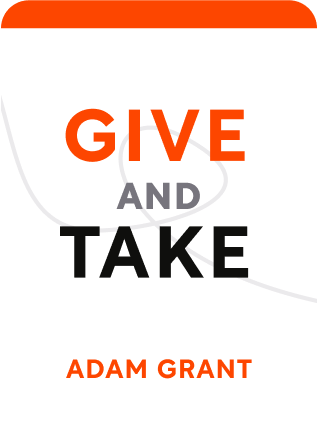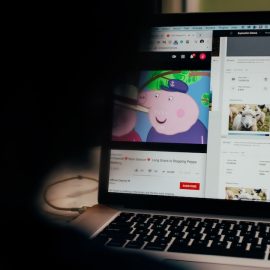

This article is an excerpt from the Shortform book guide to "Give and Take" by Adam Grant. Shortform has the world's best summaries and analyses of books you should be reading.
Like this article? Sign up for a free trial here .
What are the benefits of powerless communication? How can being less assertive help you win people over?
In his book Give and Take, Adam Grant discusses the benefits of powerless communication. Grant explains that while trying to present or sell an idea, showing some hesitancy, vulnerability, and warmth will cause your audience to trust you and be more receptive.
Here is why you should drop your aggressive approach to persuasion and adopt some humility.
The Benefits of Powerless Communication
There are two modes of communication: powerful communication and powerless communication.
Powerful communication tries to establish dominance, and takers are attracted to this style. They speak loudly and forcefully, express certainty, promote accomplishments, and have large body language. Picture a military general issuing orders.
Powerless communication tries to build prestige and admiration, and givers are attracted to this style. Powerless communicators speak less aggressively and assertively, express doubt by using disclaimers and hesitations (“um”, “sorta,” “this may be a bad idea, but”), signal vulnerability, ask questions, and rely on advice. Picture a warm, supportive teacher.
Adam Grant examines how givers and powerless communicators succeed in four areas: presenting, selling, persuading, and negotiating. In sum, powerless communication is effective because people are naturally skeptical of intentions, bristle at being ordered around, and have their own egos to protect. By asking questions and indicating vulnerability, givers become approachable, show reception to new ideas, and learn new information that helps them persuade.
Presenting Powerlessly
When giving a presentation, revealing vulnerability and humanity make you approachable and get people to empathize with you. Givers are interested in helping others, not in establishing dominance, so they’re not afraid to show vulnerability.
In contrast, takers worry that showing vulnerability will limit their ability to gain dominance. Their powerful communication, however, can clash with other people who want to assert dominance, or when the audience is skeptical of your influence, and the message gets lost.
When presenting to senior military officers, Adam Grant started his presentation with a powerless joke: “I know what you’re thinking: what can I possibly learn from a professor who’s twelve years old?” This approach lowered the officers’ defenses and led to a better reception. Instead, if Grant had tried to present his credentials and puff up his chest, the officers would have felt confrontational.
Powerless communication only works, however, if you signal your competence in other ways, such as credentials or the content of your speech. If you’re competent and vulnerable, audiences like you more. But if you’re incompetent and vulnerable, audiences like you less. This is the pratfall effect. In other words, mistakes amplify the audience’s prior conception about you.
Selling Powerlessly
Picture a stereotype of a salesperson, and you may picture a hard-charging, gregarious back-slapper who pushes you down a list of features and won’t take no for an answer.
It turns out givers are the most effective salespeople, showing higher results across industries like insurance and pharmaceuticals. Givers want to help their customers solve their problems, and they use powerless communication to achieve it. In sales, givers ask lots of questions to understand the clients’ scenario, customize a solution to best match the client’s needs, then allow the client to make her own conclusion.
Tactically, asking questions allows a salesperson to unearth new customer needs and use cases that wouldn’t have been discovered through a brute force one-size-fits-all approach. Adam Grant gives an example of an optician who approached a woman skeptical of buying expensive multifocal glasses. After asking questions about her daily sight problems and her potential use cases, the optician realizes she has a misconception that the glasses can only be used part of the day. He ultimately makes the sale.
Powerless communication in sales also works because, as a consumer, you’re flooded with strong messaging all day, from advertisers to politicians. When you hear a powerful sales pitch, you tend to get suspicious. You don’t want to be tricked, and you prefer not feeling manipulated. A giving, powerless approach guides you to making your own independent conclusions. This is refreshing and builds trust.
Furthermore, people tend to hold onto their own conclusions more strongly than they do conclusion given by other people. People like their own ideas best.
Related point: people love talking about themselves. The more you talk in a group, the more you think you’ve learned about the group, even though the information exchange was unilateral. Thus by asking questions, givers inspire joy in the talker and enable introspection leading to a conclusion.
Persuading Powerlessly
In collaborative work, powerless communication provides a safe space for new ideas. Asking questions and using powerless speech markers like “may” and “possibly” invite contrary opinions and signal a willingness to defer. From a classic giver point of view, this signals that the speaker cares primarily about the goals of the group, rather than about personal ego.
This is especially true in collaborative work, where people work together to achieve the same goal. In these scenarios, takers undermine group performance and stifle information sharing. Powerful speech here tends to signal that the taker cares primarily about asserting dominance and ego, not about the good of the group.
Studies show that powerless speech engenders more respect and influence in collaborative work, and when a group is passive. In a study of pizza franchises, when employees are proactive, powerful speech leads to 14% lower profits. (In contrast, when the work is independent and not collaborative, and employees are passive, powerful speech is effective. We’ll discuss more below).
Over time, powerless speech can allow you to build a reputation as a helpful contributor, rather than a competitor vying for political power. If you’re seen as someone reliable and pleasant to work with, the peer feedback should ultimately benefit your career, if your superiors can then attribute group success to you.
> Volkswagen account manager Don Lane contributed the “Drive it. You’ll get it.” tagline to the creative team, despite not getting credit. Instead of a powerful approach like “I’ve got the winning idea,” he presented his idea powerlessly: “I know this is against the rules, but I want to give you a sense of what I’m talking about. What do you think of this line?”
Negotiating Powerlessly
In tense situations that may appear zero-sum to many people (like negotiations over wages or deals), advice seeking is a powerful tool for exercising influence when we lack authority. Advice seeking combines expressing vulnerability, asking questions, and talking tentatively. Naturally, takers tend to avoid advice-seeking because it jeopardizes their appearance of control and harms their ego of knowing all the answers.
Advice seeking has four benefits:
- Learning: The advice giver is prompted to clarify details to give the best advice. This also puts the adviser in a brainstorming mood, where she’ll draw on more info than just voting yes/no on a pitch. The advisee benefits from this expanded knowledge.
- Perspective taking: To give good advice, advisers have to look at the situation from the advice seeker’s point of view. This creates empathy for the advice seeker rather than setting up an adversarial structure.
- Commitment: Because the adviser has put personal effort into the advice seeker’s situation, she feels commitment to follow through, especially if the top ideas are her own.
- Flattery: When you ask for someone for advice, you grant her prestige by showing you admire her knowledge and wisdom. It makes her feel important.
The adviser is also prone to liking the advice seeker more through resolving cognitive dissonance: “there’s no way I would help her if I didn’t like her, so this must mean I actually like her.”
Advice seeking works for all 3 reciprocity styles in the counterparty. Takers love having their ego massaged. Matchers like racking up credits they can use later. Givers feel helpful.
> Example: Annie was a scientist who was part of a downsized company branch in the Midwest. She could keep her job by transferring to the East Coast, but this would mean giving up her nighttime MBA program. She tried to argue for her position with a few managers but made no progress.
> Ultimately, she reached out to a HR manager and asked for advice: “if you were in my position, what would you do?” The HR manager became her advocate. She took the woman’s perspective, learned new details, and found through the department head that the company had a private jet that Annie could ride on. Now the HR manager was committed to delivering on this solution. If Annie had lobbied more powerfully, she might never have learned about the jet.
Research Data
Experimental studies show the benefits of asking for advice:
- Experimental subjects were asked to negotiate the sale of commercial property. Sellers who focused on getting the highest price reached a deal only 8% of the time. Sellers who asked the buyers for advice reached a deal 42% of the time.
- In the work force across industries, seeking advice is one of the most effective ways to curry influence and be rated as an effective manager (in addition to rational persuasion and inspirational appeal):
- All 3 of these work in all directions of the org chart: downwards to subordinates, lateral to colleagues, and upward to superiors.
- Ingratiation, exchange, and personal appeal were used primarily in downward or lateral directions, and not upward. They were ineffective at changing effectiveness rating.
- Finally, legitimating (do it because it’s what the rules say) or pressure correlate negatively with effectiveness.
- Executives seeking board seats are most effective when asking a current board director for advice, rather than complimenting.
- In an experimental environment, advice seekers were more likely to be recommended for promotion than non-seekers.
When Powerful Communication Works
When does powerful communication work? The book doesn’t cover this much, but it gives some hints.
Takers are judged by group members as more competent and authoritative. Sometimes this works against them (when it discourages new ideas). But when listeners are passive “dutiful flowers,” powerful communication does work.
(Shortform note: We see powerful communication work in Steve Jobs and TED talks. Does it work when the listener knows she’s in a subordinate and receptive position, so ego is not at play? When listening to Steve Jobs, an Apple fan already considers him a genius and is in a receptively subservient position in buying his products. “I want to be led as a dutiful follower.”
Powerful speech seems to confer more status when the task is independent rather than communal, and when the working environment rewards individual achievement rather than cooperation. In these scenarios, powerful communication may signal greater status and effectiveness, and the penalties are lower than in collaborative scenarios.)

———End of Preview———
Like what you just read? Read the rest of the world's best book summary and analysis of Adam Grant's "Give and Take" at Shortform .
Here's what you'll find in our full Give and Take summary :
- The three reciprocity styles—givers, takers, and matchers
- Why givers are the most successful in life
- How to set up a giving culture






